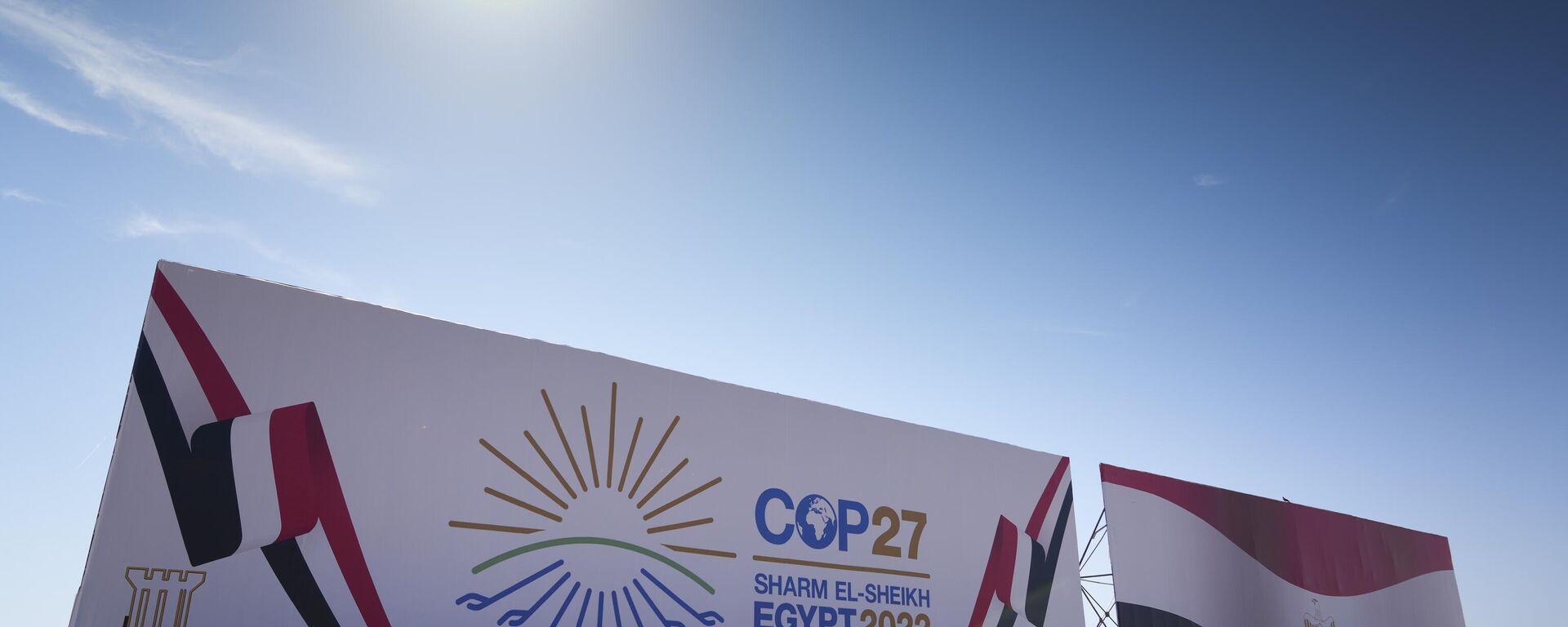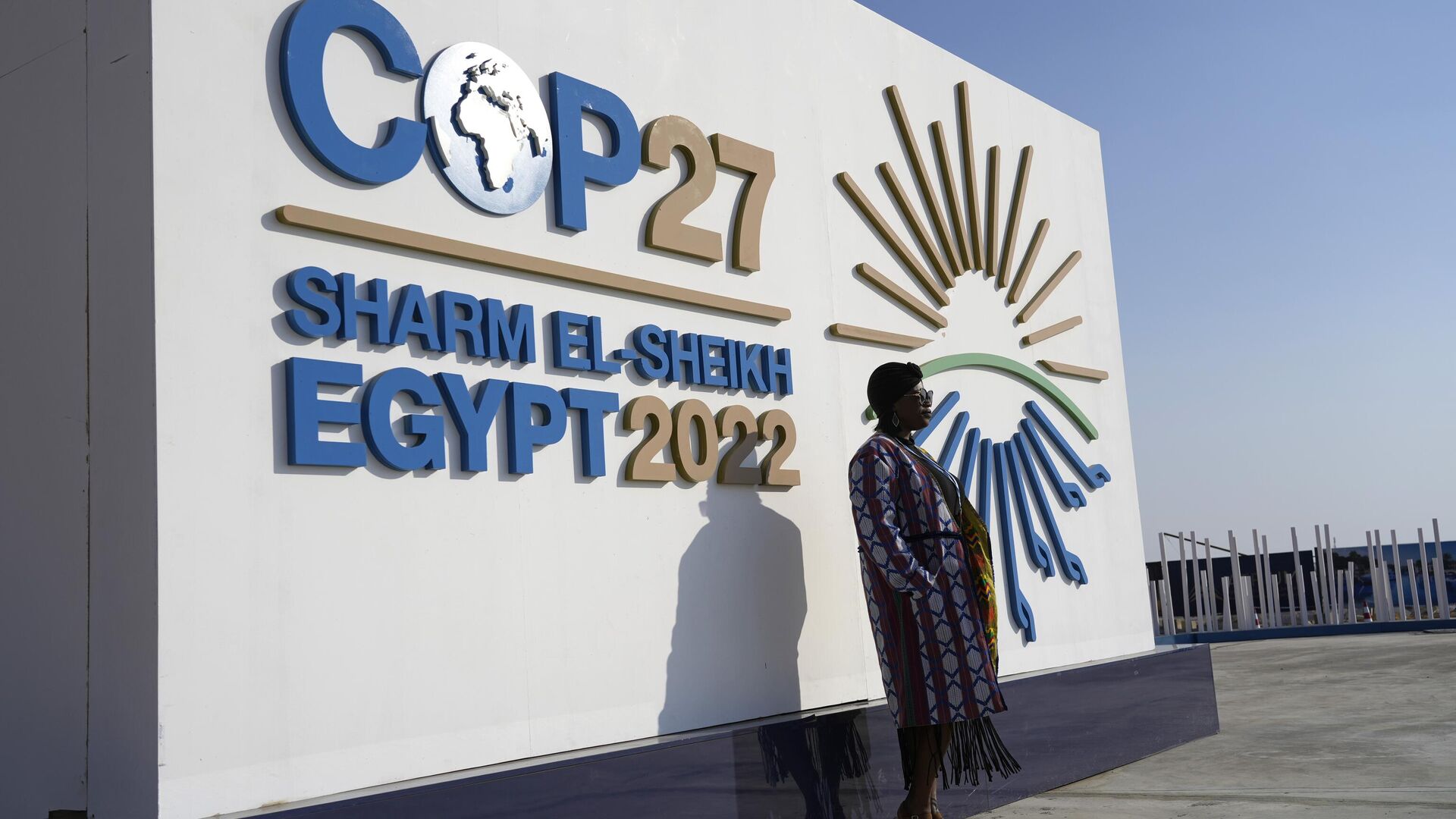https://sputnikglobe.com/20221120/africans-welcome-cop27-loss--damage-deal-but-demand-more-decisive-action-1104449503.html
Africans Welcome COP27 'Loss & Damage' Deal, But Demand More Decisive Action
Africans Welcome COP27 'Loss & Damage' Deal, But Demand More Decisive Action
Sputnik International
African officials and observers expressed different opinions concerning the recently achieved agreement on the "loss and damage" deal.
2022-11-20T11:44+0000
2022-11-20T11:44+0000
2022-11-23T11:38+0000
africa
climate change
cop27 in egypt
finance
the united nations (un)
nigeria
https://cdn1.img.sputnikglobe.com/img/07e6/0b/10/1104278632_0:160:3073:1888_1920x0_80_0_0_08fdd2ba2484d70fa499e344b37a26cd.jpg
The founding of a "loss and damage" fund has been called "historic" as it inspires hope that the world's richest countries have started to acknowledge their climate responsibilities - not only in word, but in deed.Antonio Guterres, secretary-general of the UN, called the decision "an important step towards justice", adding that the agreement "will not be enough, but it is a much-needed political signal to rebuild broken trust".The US expressed support for the development of the fund, announcing $70Mln of extra help for "African partners with climate-resilient agriculture in Southern/Central Africa" as well as "more than $300Mln in 2022 for resilient African food systems".Representatives from Africa, the continent named among those most most suffering from the climate change effects, rejoiced at the decision. Mohammed Hassan Abdullahi, Nigeria's minister of the environment who represented his country at the climate conference, said that he looks forward "with optimism to build on the successes of COP27", noting that the development and implementation of the "loss and damage" fund is the concern now.Habil Olaka, chief executive of the Kenya Bankers' Association, described the conference's outcome as "inspiring", adding that it - among other things - helped to draw attention to the role financial institutions play in the climate process.Other African experts and observers, however, were less optimistic about the outcome of the convention, saying that their expectations had been higher. NJ Ayuk, executive chairman of the South African energy legal group African Energy Chamber, said that "no deal is often better than a bad deal for Africans, our fight against energy poverty, natural gas development and our young people", referring to his concerns over the way western countries interfere in the development of Africa's energy infrastructure.Mohamed Adow, founder and director of energy and climate think-tank Power Shift Africa expressed his opinion that "the EU is starting to use [the 'loss and damage' deal] as a poison pill to fix old divisions around expanding the donor base".He also pointed out that this year's conference "was billed as an implementation COP", but in fact little progress was made, for example, in winding down fossil fuels.Adow's remarks come as part of the global discussion on the use of fossil fuel. Although international bodies specify that the fossil fuel energy sector is among the main contributors to greenhouse gas emissions, some experts have underlined that the green agenda should not curb the development of Africa's energy resources, which contributes just two or three percent to global gas emissions while suffering disproportionally from the impacts of climate change.A statement by Thuli Makama, Africa Senior Adviser of Oil Change International - a research, communication, and advocacy organization - echoed Adow's comments, identifying the phasing out of fossil fuel as the "first step in protecting our climate and communities", which the COP27 failed to agree to.Returning home from the COP27, Nigeria's Abdullahi once more pointed out how urgent climate issues are, publishing footage of "a once thriving wetland between Chad and Nigeria".
https://sputnikglobe.com/20221120/cop27-strikes-historic-deal-to-fund-poorer-nations-climate-loss--damage--1104446580.html
africa
nigeria
Sputnik International
feedback@sputniknews.com
+74956456601
MIA „Rossiya Segodnya“
2022
News
en_EN
Sputnik International
feedback@sputniknews.com
+74956456601
MIA „Rossiya Segodnya“
Sputnik International
feedback@sputniknews.com
+74956456601
MIA „Rossiya Segodnya“
2022 united nations climate change conference, loss and damage, africa at cop27, climate change in africa, african climate experts, fossil fuel in africa
2022 united nations climate change conference, loss and damage, africa at cop27, climate change in africa, african climate experts, fossil fuel in africa
Africans Welcome COP27 'Loss & Damage' Deal, But Demand More Decisive Action
11:44 GMT 20.11.2022 (Updated: 11:38 GMT 23.11.2022) On Sunday, delegates at the 2022 United Nations Climate Change Conference (COP27) came to an agreement on the "loss and damage" deal after extended negotiations. The decision involves creating a fund for financial help from the world's top emitters of greenhouse gas for those nations which have proved most vulnerable to the effects of climate.
The founding of a "loss and damage" fund has been called "historic" as it inspires hope that the world's richest countries have started to acknowledge their climate responsibilities - not only in word, but in deed.
Antonio Guterres, secretary-general of the UN,
called the decision "an important step towards justice", adding that the agreement "will not be enough, but it is a much-needed political signal to rebuild broken trust".
The US
expressed support for the development of the fund, announcing $70Mln of extra help for "African partners with climate-resilient agriculture in Southern/Central Africa" as well as "more than $300Mln in 2022 for resilient African food systems".

20 November 2022, 05:42 GMT
Representatives from Africa, the continent
named among those most most suffering from the climate change effects, rejoiced at the decision. Mohammed Hassan Abdullahi, Nigeria's minister of the environment who represented his country at the climate conference,
said that he looks forward "with optimism to build on the successes of COP27", noting that the development and implementation of the "loss and damage" fund is the concern now.
Habil Olaka, chief executive of the Kenya Bankers' Association, described the conference's outcome as "inspiring", adding that it - among other things - helped to draw attention to the role financial institutions play in the climate process.
"It is, therefore, becoming increasingly clear that no progressive institution or individual can afford to default on their climate change commitments. Environmental degradation affects every aspect of life, so remedies are participatory in nature," he wrote, adding: "According to the United Nations, two-thirds of worldwide finance is provided by banks. This presents banking institutions with a fabulous opportunity to contribute to the realisation of sustainable development goals."
Other African experts and observers, however, were less optimistic about the outcome of the convention, saying that their expectations had been higher.
NJ Ayuk, executive chairman of the South African energy legal group African Energy Chamber,
said that "no deal is often better than a bad deal for Africans, our fight against energy poverty, natural gas development and our young people", referring to his
concerns over the way western countries interfere in the development of Africa's energy infrastructure.
Mohamed Adow, founder and director of energy and climate think-tank Power Shift Africa
expressed his opinion that "the EU is starting to use [the 'loss and damage' deal] as a poison pill to fix old divisions around expanding the donor base".
"We also don’t need a fund in name only. A fund that doesn’t specify the requirement for historic polluters to deliver finance, and shifts the burden to undefined ‘other sources’ won’t meet the needs of vulnerable countries facing the adverse effects of climate change," Adow said.
He also pointed out that this year's conference "was billed as an implementation COP", but in fact little progress was made, for example, in winding down fossil fuels.
Adow's remarks come as part of the global discussion on the use of fossil fuel. Although international bodies
specify that the fossil fuel energy sector is among the main contributors to greenhouse gas emissions, some experts have
underlined that the green agenda should not curb the development of Africa's energy resources, which
contributes just two or three percent to global gas emissions while suffering disproportionally from the impacts of climate change.
A
statement by Thuli Makama, Africa Senior Adviser of Oil Change International - a research, communication, and advocacy organization - echoed Adow's comments, identifying the phasing out of fossil fuel as the "first step in protecting our climate and communities", which the COP27 failed to agree to.
"We won’t stop fighting until we achieve climate justice for Global South communities," he added.
Returning home from the COP27, Nigeria's Abdullahi once more pointed out how urgent climate issues are, publishing footage of "a once thriving wetland between Chad and Nigeria".



